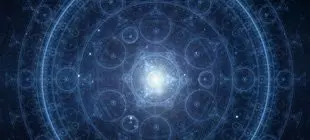Man has known since ancient times that there was a close relationship between terrestrial phenomena (changing of the seasons) and the movements of the stars. People consequently looked for links between the heavens and the earth, for a celestial cause with a visible impact on Earth. In fact, it was in observing the positions of the sun and the moon, and their influence on the tides, that Man became really aware of a connection between the movements of the planets and the consequences that could be seen to have a physical effect on the natural world. This is how calculations regarding the ephemeris and calendars came into being.

Astrology seems to have appeared around 3000 BC in Sumer. It was actually the Chaldeans who began to look at the planets, but Astrology considered as a mathematical science comes from the Greeks. The Greeks rationalised the observation of the planets and tried to make it into a science. Before them, astrology was merely about observing the planets and working out their tangible influence on earth in relation to their movements.
It was in Alexandria that astrology took off. In the 2nd century, this Egyptian city was the most important cultural centre of the entire Mediterranean area. This was the meeting point for the cultures of Greece, Egypt and Mesopotamia. Thanks to Claude Ptolemy, all the knowledge of these differing cultures were to be brought together and this gave rise to the fundamental principles of astrology in 140 AD. Ptolemy was a great mathematician and astronomer, well-known at the time. He was the one to pass on the Greek astrological tradition, which would automatically be adopted in Europe up until the 17th century. Although the first horoscope was of Babylonian origin (419 BC), one can say that it is thanks to Greek science and Ptolemy, that horoscopes were drawn up in a more rational manner. Without them, we would not have known how to map the night sky.
Astrology made its first appearance in Rome in the 2nd century BC. Greek slaves of the Romans unveiled the secrets of this new science to their masters. Under the reign of Augustus, astrology took on a great importance, becoming part of Roman social fabric and customs. At that time, it lost all religious connotations and became a divinatory art.
In the 4th century AD, astrology was considered to be a science by some and a religion by others. Christianity was to reject this divinatory art, on the grounds that it was a dangerous pagan superstition. Astrology therefore gradually disappeared from the social fabric, giving way to the Christian religion. It would not reappear in Europe until the Middle Ages, when it was re-introduced by the Arabs.
St Thomas Aquinas was the man who introduced astrology to Christian thought in a definitive way. Thanks to his efforts, a Chair of Astrology was created at the Schools of Medicine of Bologna, Padua and Milan. Many physicians at the time treated their patients in line with astrological principles.
Pope Leon X, who was also very keen on astrology, developed the resources needed for research in this area. He created a Chair of Astrology at La Sapienza. In France, Louis XIV in person consulted the famous astrologer, Galeotti, for advice. And Catherine de Medici followed the enlightened advice of astrologers Luc Gauric and Cosmo Ruggieri, as well as Michel de Nostredame, more commonly known as Nostradamus.
After the reign of Catherine de Medici, astrologers of repute were given the title of astrologer-physician. Men such as Morin de Villefranche, a great 16th century astrologer, were very successful advisers to Richelieu.
Astrology in Advanced Societies
Throughout history, we have become aware that astrology was respected, listened to and heard in societies which were technically and intellectually advanced. Its importance was therefore not dependent on the period, but on cultural advances in society. Communities with an open outlook on the world were happy to take advice from astrologers. The great leaders of the world (Louis XIV, Catherine de Medici…) consulted them. During the Renaissance, which was an era rich in science and culture, the astrologers intervened in the politics of countries. In Hungary, they consulted astrologers to decide on a date for building the University of Pressburg. In England, astrologers had the status of ambassadors. Knowledge of astrology was taught in the universities, without any taboo. Then came the Age of Enlightenment, and philosophers such as Diderot and Voltaire began to mock astrology. This was also a time when the monarchy was going through a period of transition and all knowledge came under scrutiny. Colbert banned the teaching of astrology for all academics and the German philosopher, Leibniz, declared that the use of astrology to predict the future was built on "pure illusion". And yet, astrology and the observation of planetary movements was one of the aspects of knowledge which had proved the most useful in the survival of civilisations, particularly in Egypt.
The first divinatory calendars appeared in Egypt, China and pre-Columbian America. These are the first signs of astrology. The best known are the Egyptian divinatory calendars, which are also known as Nilotic calendars. These came into existence as a result of observing the fluctuations of the Nile and the need to prepare for the flooding of its waters. By predicting these floods, the Egyptians were able to cultivate their lands more effectively. In Egypt, the Nile has always been the river of life and the whole of Egyptian society is organised around it. The astrologers were not attempting to tame nature, as we do today with our modern technological methods, but were trying to live in harmony with her. Predicting the floods was vital for the survival of the community.
1500 years ago, simply by watching Sirius rising, the Egyptians were able to predict the flooding of the river and knew how to work out when a new annual cycle would begin. For them, science and religion complemented each other. Egypt was the first civilisation to divide the year into 12 months and 365 days. These divinatory calendars were very different from astrology as we know it today, but nevertheless provided it with a starting point. Without Man's desire to want to find out about the future and predict future events, astrology would never have existed.






